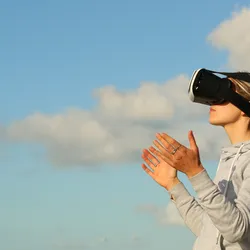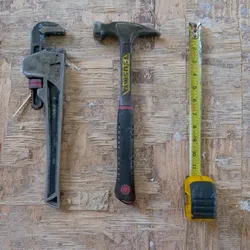
Level 1:
Virtual reality is a special technology. It creates pretend worlds that you can see and play in. It’s like wearing special glasses and being in a different place. Virtual reality can make things more real and exciting. It changes the way we do things. It’s a big change that makes everything different. It’s like a new way of thinking. Virtual reality is fun and can make us happy. We can do things we couldn’t do before. It’s like magic! It helps us learn and understand better. We can see things we can’t normally see. It’s like having superpowers! Virtual reality is amazing and makes our world better.
Level 2:
Virtual reality is a special technology that creates imaginary worlds for us to explore. It’s like wearing special glasses that transport us to different places. Virtual reality makes things feel more real and exciting. It changes the way we do things and opens up new possibilities. It’s a big change that can make everything different. Virtual reality is a fun and enjoyable experience that brings happiness. It helps us learn and understand things better. We can see things that are not possible in our normal lives. It’s like having special powers! Virtual reality is incredible and makes our world even more fascinating.
Full Story:
Title: Unleashing the Immersive Potential of Virtual Reality: A Paradigm Shift?
Introduction: Virtual Reality (VR) has rapidly transformed from a futuristic concept to a tangible reality, revolutionizing the way we interact with digital content. With its ability to transport us to entirely new worlds, VR has captured the imagination of tech enthusiasts and content creators alike. In this article, we will delve into the immersive potential of virtual reality, exploring its impact across various industries and questioning whether we are on the verge of a paradigm shift in human experiences.
Redefining Entertainment: Virtual Reality has the power to redefine entertainment as we know it. Imagine stepping into a virtual stadium, feeling the roar of the crowd, and witnessing your favorite sports team in action, all from the comfort of your living room. With VR, the boundaries of traditional media are shattered, enabling us to be active participants rather than passive spectators. Are we witnessing the dawn of a new era in immersive gaming, where players are completely immersed in their favorite virtual worlds?
Transforming Education: The educational landscape stands to benefit immensely from the integration of virtual reality. Complex scientific concepts can be visualized, historical events can be relived, and distant places can be explored, all through immersive VR experiences. Will virtual reality become a game-changer in classrooms, captivating students and enhancing their learning experiences? The ability to learn by doing, rather than simply reading or listening, has the potential to revolutionize education for generations to come.
Empathy and Social Impact: Virtual Reality has the unique ability to evoke empathy and compassion by allowing users to step into the shoes of others. Whether it’s experiencing the daily challenges of someone with a disability or witnessing the devastating consequences of climate change, VR has the power to create a deeper understanding of diverse perspectives. Can virtual reality serve as a catalyst for social change, fostering empathy and driving collective action towards a more inclusive and sustainable world?
Revolutionizing Healthcare: The healthcare industry is no stranger to technological advancements, and virtual reality is poised to revolutionize the way medical professionals diagnose, treat, and train. Surgeons can practice complex procedures in a virtual environment, reducing the risk for patients. VR therapy can help individuals overcome phobias and manage chronic pain. Could virtual reality be the key to transforming healthcare into a more personalized and effective experience for patients worldwide?
Impact on Business and Communication: Virtual reality has the potential to reshape the way we do business and communicate. Remote collaboration, virtual meetings, and immersive product demonstrations are just the tip of the iceberg. Will VR break down physical barriers and enable teams to work seamlessly across continents, fostering innovation and driving global connectivity? How will businesses leverage the immersive nature of VR to enhance customer experiences and revolutionize marketing strategies?
Conclusion: Virtual Reality has emerged as a powerful tool, reshaping the way we experience entertainment, education, empathy, healthcare, and business. The immersive potential of VR opens up a world of possibilities, challenging traditional boundaries and offering new avenues for human interaction and exploration. As we navigate this technological frontier, it is essential to explore the ethical implications and ensure that virtual reality is harnessed responsibly for the betterment of society. Are we on the brink of a paradigm shift in human experiences? Only time will reveal the true extent of virtual reality’s transformative power.
Questions:
How does virtual reality work?
Answer: Virtual reality is a technology that creates simulated environments using special equipment like glasses or headsets. It tricks our senses into believing that we are in a different place, making the experience feel real and immersive.
What are some ways virtual reality can change the way we do things?
Answer: Virtual reality can change the way we entertain ourselves, learn, and even empathize with others. It offers new and exciting experiences, such as playing immersive games, exploring virtual classrooms, or understanding different perspectives through empathy-building simulations.
Do you think virtual reality is only for fun?
Answer : No, virtual reality is not just for fun. While it does provide enjoyable experiences, it also has educational and practical applications. It can be used to enhance learning, training, and even improve healthcare procedures.
Can virtual reality make us feel like we have superpowers?
Answer: Yes, virtual reality can give us a sense of having superpowers. It allows us to do things that may not be possible in real life, such as flying or interacting with fantastical creatures or objects. It offers a unique sense of empowerment and imagination.
How does virtual reality contribute to making our world more fascinating?
Answer: Virtual reality adds an extra layer of excitement and wonder to our world. It allows us to explore new places, experience things we wouldn’t otherwise have access to, and understand concepts in a more immersive way. It expands our horizons and opens up a world of possibilities.
Fill in the Blanks:
phobias, integration, revolutionize, spectators, traditional, participants, catalyst, interaction, passive, media, reshape, dawn, boundaries, connectivity, era, distant, compassion, immersive, Immersive, content
Title: Unleashing the ________ Potential of Virtual Reality: A Paradigm Shift?
Introduction:
Virtual Reality (VR) has rapidly transformed from a futuristic concept to a tangible reality, revolutionizing the way we interact with digital ________.
In this article, we will delve into the ________ potential of virtual reality, exploring its impact across various industries and questioning whether we are on the verge of a paradigm shift in human experiences.
With VR, the ________ of ________ ________ are shattered, enabling us to be active ________ rather than ________ ________.
Are we witnessing the ________ of a new ________ in immersive gaming, where players are completely immersed in their favorite virtual worlds?
Transforming Education:
The educational landscape stands to benefit immensely from the ________ of virtual reality.
Complex scientific concepts can be visualized, historical events can be relived, and ________ places can be explored, all through immersive VR experiences.
The ability to learn by doing, rather than simply reading or listening, has the potential to ________ education for generations to come.
Empathy and Social Impact:
Virtual Reality has the unique ability to evoke empathy and ________ by allowing users to step into the shoes of others.
Can virtual reality serve as a ________ for social change, fostering empathy and driving collective action towards a more inclusive and sustainable world?
VR therapy can help individuals overcome ________ and manage chronic pain.
Impact on Business and Communication:
Virtual reality has the potential to ________ the way we do business and communicate.
Will VR break down physical barriers and enable teams to work seamlessly across continents, fostering innovation and driving global ________?
The immersive potential of VR opens up a world of possibilities, challenging traditional boundaries and offering new avenues for human ________ and exploration.
Vocabulary:
Virtual Reality: A technology that creates a simulated environment, allowing users to interact with and experience computer-generated content as if they were physically present in that environment.
Immersive: Providing a deeply engaging and realistic experience that completely captures one’s attention and involvement.
Paradigm Shift: A significant change in the way something is perceived, understood, or approached, often resulting in a new way of thinking or doing things.
Content: Information, data, or media that is created or presented for consumption, such as videos, images, articles, or games.
Revolutionize: To completely transform or drastically change something, often by introducing new ideas, technologies, or approaches.
Interaction: The act of communicating or engaging with something or someone, typically involving a two-way exchange of information or actions.
Enthusiast: A person who is highly interested and passionate about a particular subject or activity.
Capture: To seize or grasp something, in this context, referring to capturing one’s attention or interest.
Boundaries: Limits or restrictions that define the extent or scope of something.
Shatter: To break or destroy something into many small pieces or to completely disrupt or undermine it.
Traditional: Relating to or based on long-established customs, practices, or beliefs.
Media: Various forms of communication, such as television, radio, newspapers, and the internet, that are used to disseminate information or entertainment to the public.
Participants: Individuals who take part in an activity or event, actively engaging and being involved.
Passive: Not actively participating or engaged, but rather observing or receiving without active involvement.
Spectators: People who watch or observe an event or activity without participating directly.
Dawn: The beginning or start of something, often referring to the first appearance of light at the break of day.
Era: A period of time characterized by particular conditions, events, or trends.
Integration: The act of combining or bringing different elements or parts together into a unified whole.
Visualize: To form a mental image or picture of something, often using the imagination.
Relive: To experience again in one’s mind or memory, as if it were happening anew.
Distant: Far away in space or time; not close or immediate.
Perspective: A particular way of viewing or understanding a situation, object, or concept.
Catalyst: Something that stimulates or accelerates a change or process.
Compassion: A feeling of deep sympathy and understanding for the suffering or difficulties of others, often accompanied by a desire to help or alleviate their pain.
Evolve: To develop or change gradually over time, often resulting in a more advanced or complex form.
Phobias: Intense and irrational fears or aversions towards specific objects, situations, or activities.
Catalyst: Something that stimulates or accelerates a change or process.
Revolutionize: To completely transform or drastically change something, often by introducing new ideas, technologies, or approaches.
Reshape: To change the form, structure, or character of something.
Connectivity: The state or quality of being connected or linked together, often referring to technological or communication connections.




